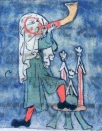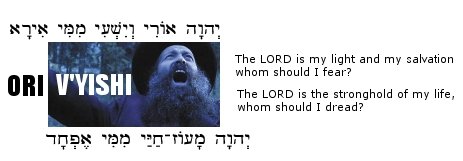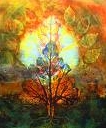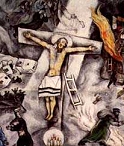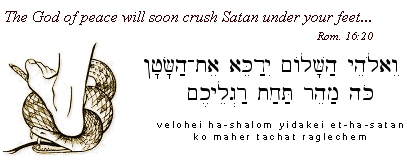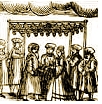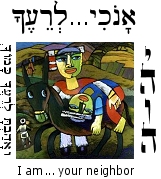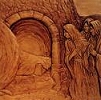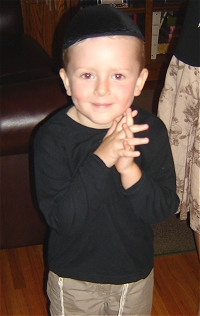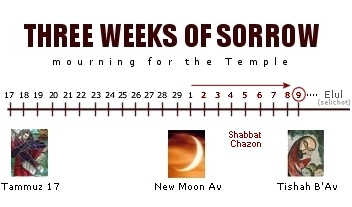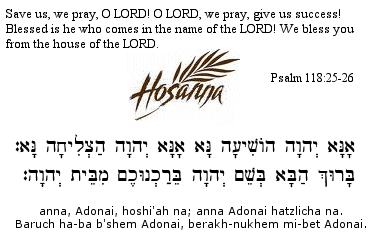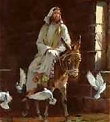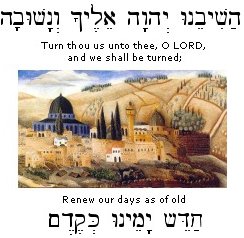|
|
|||||||||||||||||||||
 |
|||||||||||||||||||||
|
Learn Hebrew |
|||||||||||||||||||||
 |
|||||||||||||||||||||
|
Learn Torah |
|||||||||||||||||||||
|
August 2008 Updates Rosh Chodesh Elul - ראש חדש אלול 08.31.08 This evening marks Rosh Chodesh Elul (the "new moon" of the Hebrew month of Elul), which, according to Jewish tradition, was the time when Moses reascended Mount Sinai (the third time) to receive the second set of Tablets from the LORD. Since the tablets were not inscribed until 40 days later (on the 10th of Tishri, the date of Yom Kippur), the 29 days of Elul are considered a time of selichot (prayers for forgiveness) in anticipation of the Ten High Holy Days (Tishri 1-10). For more, see this page.
Another Book Project... 08.30.08 Since I am having a hard time finding a job, I decided it might be worthwhile to begun writing a new book (I will provide more details as things develop, chaverim). Your prayers for my strength in this matter are appreciated... Meanwhile, please know that Olga and I are moved to tears over the outpouring of love and support from many of you. Thank you for standing with us during this difficult time! 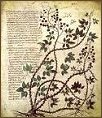
Choosing to See...  08.27.08 This week's parashah (Re'eh) begins with the portentous words: "See (רְאֵה), I give before you today a blessing and a curse" (Deut. 11:26). This has traditionally been understood to mean that God gives each of us the path of goodness (that leads to blessing) and the path of wickedness (that leads to curse). The singular form (re'eh is singular: "you see!") is used to stress the fact that although Torah is given to all "who have ears to hear," it is our personal responsibility to "choose life!" (Deut. 30:19) and walk its message out in our daily lives. This is an Either/Or of the heart, and there is no place for compromise in this decision. Moreover, since your life is part of a greater whole, you must understand that every deed you do brings to the world around you either a blessing or a curse.... To "correct" the world you live in (תיקון עולם), you must first correct yourself (Matt. 7:5). An undisputed maxim among the sages of the Talmud is: "All is in the hands of God except the fear of heaven (yirat shamayim)" (Berachot 33b; Niddah 16b). But note something here. The Hebrew word for seeing (ראה) and the word for fearing (ירא) share the same root. We cannot genuinely "choose life" apart from personally seeing it, and we cannot see it apart from encountering its truth (or reality). We must individually focus our minds and attend to the revelation of God -- both written (i.e., in the testimony of Scripture) and unwritten (i.e., in the manifest evidences of creation). The reverence of God sanctifies our perception and enables us to see clearly. Perhaps this is why the perpetual enemy of God is called "Amalek" (עֲמָלֵק), a name that begins with Ayin (symbolizing the eye) and whose value (in gematria) is 240 -- the same value for safek (סָפֵק), the Hebrew word for doubt. Amalek therefore suggests "the eye of doubt," or even "the severed eye" (the Hebrew verb מָלָק means "to chop" or "sever" in reference to the "eye" of Ayin). Unbelief is a spiritual blindness that makes it impossible to see the path of blessing.... Unlike the doubtful Amalek, we walk in emunah (faith) with ayin ha-tovah ("the good eye") of trust. And we must be unflinching in our devotion to the truth, chaverim. Regarding the rise of the false prophet, for example, we are told that "the LORD your God is testing you (מְנַסֶּה יְהוָה אֱלהֵיכֶם) to know if your really love the LORD your God with all your heart and with all your soul" (Deut. 13:4). All who love the LORD will love the truth and will take the time and effort to clear away the confusion by "testing the spirits" (1 John 4:1). There once happened that a person gave 100 measures as his ma'aser (tithe) each year, for every 1000 measures of grain that grew. In his will, he commanded his son to always take ma'aser properly. The whole idea of giving is counterintuitive to the egoism of our natural perspective, and therefore the giving person testifies that he or she is seeing the truth of God's reality and kingdom in the universe.... Stated simply: Hardening our hearts to the needs of others is an act of unbelief.
Personal Update... 08.26.08 Today my wife Olga went to the doctor and heard the baby's heartbeat! Baruch Hashem! We are thrilled at the prospect of new life coming to our family, though we entreat your prayers for this child (and for momma, too, as she has been very sick with morning sickness for the last 10 weeks). The baby's due date (IY"H) is in March, 2009. I will keep you posted as things develop, chaverim.... Some of you have been kind enough to write and ask how the job search is going, etc. Well, I've sent out a number of resumes, etc., but I still have yet to obtain an interview anywhere... We are not living in fear, however, since we are trusting in the LORD's provision and we know that many of you are praying for us. We humbly and sincerely thank you....  I have also been experiencing fibromyalgia, sleep deprivation, asthma, etc. recently. Part of this is due to the stress of our situation. You prayers for us are sincerely appreciated.... Rosh Chodesh Elul - ראש חדש אלול  08.24.08 The season of teshuvah (repentance) begins next week, chaverim, running 40 days from the day before the Hebrew month of Elul until after Yom Kippur (this year, from Aug. 31st - Oct. 9th). According to Jewish tradition, Rosh Chodesh Elul (the first day of the month of Elul) marks the time when Moses reascended Mount Sinai (the third time) to receive the second set of Tablets from the LORD. Since the tablets were not inscribed until 40 days later (on the 10th of Tishri, the date of Yom Kippur), the 29 days of Elul are considered a time of selichot (prayers for forgiveness) in anticipation of the Ten High Holy Days (Tishri 1-10). For more, see this page. Note: For a variety of reasons, Rosh Chodesh Elul is observed for two days, the 30th of Av and again on Elul 1 (this year, Aug. 31st and Sept. 1st). Beginning on the second day of Rosh Chodesh Elul (and continuing until Erev Rosh HaShanah) the custom is to blow the shofar every day (except on Shabbat). Psalm 27 is often recited every day during this time as well... Parashat Re'eh - פרשת ראה 08.24.08 The Torah reading for this coming Shabbat is Re'eh ("See!"), the 47th portion of the Hebrew year of 5768.  The parashah begins with a dramatic appeal to Israel to choose to obey the commandments of the LORD: "See, I set before you blessing (beracha) and curse (kelalah)" - a blessing if you follow God's ways, but a curse if you turn to idolatry and forsake the way of the LORD. The LORD did not bring His people into the land in order to live pietistically selfish or self-aggrandizing lives, but rather to serve Him and others in love. The regular practice of tzedakah (charity) and shemitat kesafim (the forgiving of debts) were intended to promote a dignified society of people that cared for one another as mishpachah (family). Thus the LORD's people themselves were to be am segulah - a treasured people - helping to create a world of chesed (love) and beauty for all who are trusting in the LORD. Lechem Ha-Chayim - לֶחֶם הַחַיִּים 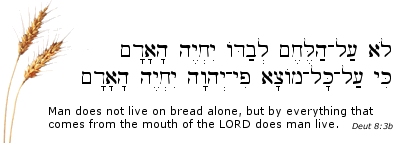 08.21.08 The parashah for this week (Eikev) includes the famous statement: "Man does not live by bread alone, but from everything that comes from the mouth of the LORD shall he live" (Deut. 8:3). Note that Yeshua quoted this verse when he was tested with physical hunger in the wilderness (Matt. 4:3-4). Yesterday I wrote about how God cleaves to us and therefore calls us to cleave to Him in return (devakut). Some scholars think that the Hebrew word for seeing (ראה) and the word for fearing (ירא) share the same root, and therefore we can close our spiritual eyes by not revering the works of the LORD. Similarly, we can close our spiritual ears by not heeding to His words of love for our soul... New Hebrew Meditation - Devakut 08.20.08 The Hebrew word devakut (דְּבָקוּת) means "cleaving" and refers to communion with God. This word derives from the Hebrew root davak (דבק), meaning to "cling" or "stick" (the Modern Hebrew word for glue is devek which likewise comes from the same root). Today I wrote a new Hebrew meditation (Devakut) based on Deut. 10:20, "You shall revere the LORD your God. You shall serve him and cleave to him." I hope you find it helpful, especially as we near the season of teshuvah. 
Sick with a cold... 08.19.08 I am sick with a cold/flu thing I picked up over the weekend. Your prayers for my healing are appreciated, chaverim.... Parashat Eikev - פרשת עקב 08.18.08 The Torah reading for this coming Shabbat is Eikev ("on the heel of," or "because"), the third portion of the book of Devarim (Deuteronomy). It begins: "And it will be (v'haya) because (eikev) you heed these judgments, and guard and do them, the LORD your God will keep with you the covenant and the steadfast love that he swore to your fathers."  Eikev comes from the root akav (עקב, to "take by the heel"), as does the name Ya'akov (Jacob), who had "grabbed the heel" of his twin brother Esau while still in the womb of Rebecca. The first occurrence of this root appears in Genesis 3:15 (the "protoevangelium") where the LORD prophesied that even though the Mashiach's heel (עָקֵב) would be bruised, the entire head (ראשׁ, rosh) of the nachash (satan) would be crushed. B"H: Yeshua is our Serpent Slayer! In the Weekly Torah Reading Cycle, the Haftarot (readings from the Nevi'im, or prophetic writings) usually follow the Torah reading for the week. However, beginning with the Three Weeks of Sorrow until after the High Holidays, these readings change. First are three Haftarot of Punishment (leading up to Tishah B'Av), then Seven of Consolation (for the seven weeks until Rosh Hashanah), and finally one of Repentance (on Shabbat Shuvah, the Sabbath before Yom Kippur). This week is the second of the seven "haftarot of consolation" that leads up to Rosh Hashanah, the Jewish New Year. Tu B'Av (ט"ו באב) - The Final Festival  08.15.08 Hebrew letters may be used to express numbers. The word "Tu" (ט"ו) is an acronym for the number 15 - derived from Tet (9) and Vav (6). The phrase "Tu B'Av" indicates the 15th day of the month of Av (which this year coincides with Shabbat Nachamu on August 15/16th), the time of the full moon. The first mention of Tu B'Av (also called chamishah Asar b'Av) is in the Mishnah, where Shimon ben Gamliel is quoted as saying, "There were no better (i.e. happier) days for the people of Israel than the Fifteenth of Av and Yom Kippur, since on these days the daughters of Israel go out dressed in white and dance in the vineyards. What were they saying: Young man, consider whom you choose to be your wife... (Taanit, Chapter 4). Since it is the "last" festival of the Jewish year, prophetically Tu B'Av pictures our marriage to the Lamb of God (Seh Elohim), the LORD Yeshua our beloved Mashiach. Click here to learn more about this special holiday of love and romance!
I AM ... Your Neighbor 08.14.08 This week's Torah portion (Vaetchanan) repeats Aseret Hadibrot (the Ten Commandments) as they were initially given in Parashat Yitro (Ex. 20:2-17). Though there are some slight language differences between the Exodus and Deuteronomy versions, both begin with "I AM" (אָנכִי) and both end with "[for] your neighbor" (לְרֵעֶךָ). Joining these together says "I am your neighbor," indicating that the LORD Himself is found in your neighbor. When we love our neighbor as ourselves (אָהַבְתָּ לְרֵעֲךָ כָּמוֹךָ), we are in effect showing love for the LORD. We must learn to disregard the claims of our ego and cling to the idea of chesed. So who is your neighbor? You are -- to every other soul you may encounter this day...
Spirit and truth, chaverim: בְּרוּחַ וּבֶאֱמֶת. Deuteronomy 4:39 commands us to "know this day and lay it to your heart that the LORD is God alone." The glory of the LORD fills the entire earth (Isa. 6:3). It's never sufficient to merely know about the LORD. Holy knowledge must be taken into the heart so that the will conforms to the truth.... A New Son will Rise - פרשת ואתחנן  08.13.08 Do you know which book of the Bible was Jesus' favorite? Yes, it was Devarim (Deuteronomy). And regarding Devarim, parashat Vaetchanan is one of its richest portions. The rock was a picture of Him who was stricken for His people (Isa. 53:4 and 1 Cor. 10:4), and Moses' second striking suggested that Mashiach would need to be stricken a second time in order to provide the needs of the people. No! The Rock that was once smitten for the people was now to be spoken to as the Living Rock (1 Cor. 10:4). The entire Exodus was a parable: "As below, so above" (and conversely). Moses conveyed the wrong message, suggesting that the first striking had been insufficient and that something more was needed. The price he paid for this disobedience was severe: exile from the Promised Land. And so it is to this day: those who attempt to add to the work of the LORD by affecting works of their own righteousness will likewise find themselves in a state of exile from grace.... Yehoshua was Moses' faithful companion at Sinai (Ex. 24:13) and overseer of the "Tent of Meeting" (אהל מועד), taking every opportunity to be near God's presence (Ex. 33:11). He was a capable commander of the armies of Israel who regularly routed the enemy in battle (Ex. 17:9, etc.). Yehoshua was humble and of impeccable moral character, a true servant of Israel filled with Holy Spirit (Num. 27:18). Before the catastrophe of the Sin of the Spies, Moses renamed him from Hoshea (הוֹשֵׁעַ) to Yehoshua (יְהוֹשֻׁעַ), appending the letter Yod to make his name begin with a divine prefixive (יָהּ־). Yehoshua (i.e., Joshua) and Yeshua (i.e., Jesus) come from the same Hebrew root yasha (ישׁע) meaning "salvation" (in the Greek LXX, Joshua is spelled Ιησους, the same spelling for Jesus in the New Testament). Yehoshua was steadfast in his faith (Num. 32:12) and willing to be "despised and rejected of men" rather than appease the mob... In Aramaic (the language of the Talmud), the word Nun means "fish," a symbol of activity and life. The first mention of the word is in Exodus 33:11 in reference to Yehoshua, the "son of Nun." Yehoshua, the one who succeeded Moses and was able to enter the Promised Land, was the "Son of Life" - a clear picture of Yeshua our Mashiach, blessed be He... Shabbat Nachamu - שבת נחמו 08.11.08 The "Three Weeks of Sorrow" are now over and the Sabbath immediately following Tishah B'Av is called שבת נחמו (Shabbat Nachamu) the "Sabbath of Comfort," based on the Haftarah reading of Isaiah that begins: נַחֲמוּ נַחֲמוּ עַמִּי - Nachamu, Nachamu ami - "be comforted, be comforted, my people..." The sages reasoned that the word nachamu was repeated to offer consolation for both of the Temples that were destroyed. Thematically, this shabbat marks a time of joy over our anticipated comfort: Despite our present tribulations, in the end the LORD will vindicate His glory and completely ransom His people.  The Torah portion for the Shabbat Nachamu is Parashat Vaetchanan (פרשת ואתחנן). This portion of Torah includes some of the most fundamental texts of the Jewish Scriptures, including the Ten Commandments, the Shema (the duty to love God and study His Torah), and the commandments of tefillin and mezuzot (please see the links for each of these topics in the commentary for the Torah reading). In addition, this portion includes Moses' prediction of the galut (exile) and the eventual redemption of the Jewish people in acharit hayamim (the latter days). Josiah's Upsherin (First Haircut) 08.08.08 Our beloved three-year-old son, Josiah, had his very first first haircut today (called an upsherin, אפשערן). Here are some before/after pictures, chaverim:  Among the Chasidic community, upsherin marks a boy's entry into the commencement of Torah study. A kippah (yarmulke) and tzitzits can now be worn and the boy will be taught to read the Hebrew alphabet. On another note, some of you have been kind enough to write me and ask how the job search is going. Well, I have sent out resumes, emails, etc., and we are fervently praying for God's direction, but so far ... nothing. Nonetheless we are not discouraged, since Yeshua told us to seek first the Kingdom of God and His righteousness (מלכוּת אלהים וצדקתוֹ), and all the daily cares of this world would be provided for by the Lord (Matt. 6:33). As King David wrote: "In the time of trouble he shall hide me in his pavilion: in the secret of his tabernacle shall he hide me; he shall set me up upon a rock" (Psalm 27:4). God will never forsake us, chaverim (Psalm 37:25, Matt. 28:20, Heb. 13:5, etc.). Tishah B'Av - תשׁעה באב  We are nearing the end of the "Three Weeks of Sorrow," a 21 day period of national mourning for the destruction of the Jewish Temple. The Sabbath immediately preceding Tishah B'Av (the Ninth of Av) is called Shabbat Chazon (שבת הזון - the "Sabbath of vision"), based on the Haftarah reading (Isaiah 1:1-27) that gives a vision of the coming destruction of the Holy Temple. It is common during this time to confess the sins in our lives that likewise contribute to the lack of God's Presence in our midst.
Note: The fast of Tishah B'Av begins Saturday, August 9th at sundown. For more information, click here. Sinat Chinam and Tishah B'Av 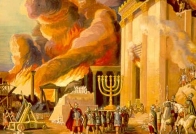 08.07.08 Tishah B'Av remembers the destruction of the two Holy Temples of Judaism. According to the Talmud (Yoma 9b), the first Temple was destroyed (586 BC) because of the sins of idolatry, immorality, and bloodshed, but the Second Temple was destroyed (70 AD) because of what the sages call "baseless hatred." This baseless hatred (called sinat chinam) is considered a more serious offence than the earlier sins that led to the destruction of the First Temple: It took 70 years to rebuild the First Temple, but Jews are still waiting to rebuild the Second Temple, even after more than 1,900 years.... Why was the first Sanctuary destroyed? Because of three [evil] things which prevailed there: idolatry, immorality, bloodshed. But why was the second Sanctuary destroyed, seeing that in its time they were occupying themselves with Torah, [observance of] precepts, and the practice of charity? Because therein prevailed hatred without cause. That teaches you that groundless hatred is considered as of even gravity with the three sins of idolatry, immorality, and bloodshed together. (Talmud: Yoma 9b) Though sinat chinam (שִׂנְאַת חִנָּם) is often translated as "baseless hatred," it literally means "hatred of [their] grace (חֵן, chen)." In essence, then, sinat chinam is the rejection of God's grace. But since Yeshua the Mashiach is the embodiment of all of God's grace (John 1:17, etc.), sinat chinam represents a rejection of Him... Is it any wonder, then, that the Mashiach foretold the destruction of the Second Temple based on Israel's rejection of Him (Matt. 24:2)? Matthew notes that hoshiah na was addressed to Yeshua Himself, "to the [greater] son of David" (לְבֶן־דָּוִד), thereby indicating that the Messianic Hope was presented to Israel (Matt. 21:9). For a flickering moment the proper praise was given to Yeshua as Mashiach ben David, though of course He had come to them as Mashiach ben Yosef, their Suffering Servant, the One of whom the prophet Isaiah clearly foretold. Immediately after his "triumphal entry," Yeshua went directly to the Temple and drove out all who sold there, overturning the tables of the "money changers" and the seats of those who sold pigeons (Matt. 21:12). After this the blind and the lame were able to enter the Temple -- and Yeshua healed them. After Yeshua ended his denunciation, he lamented for Jerusalem: O Jerusalem, Jerusalem, the city that kills the prophets and stones those who are sent to it! How often would I have gathered your children together as a hen gathers her brood under her wings, and you would not! See, your house is left to you desolate. For I tell you, you will not see me again, until you say, 'Blessed is he who comes in the name of the Lord' (בּרוּךְ הבּא בּשׁם יהוה). - Matt. 23:37-39 After this, Yeshua left the Temple for good and never looked back. In Matthew 24 Yeshua's disciples made a last-ditch appeal for Jewish tradition and ceremony by pointing out the glory of the Second Temple. "Look at these beautiful buildings of the Temple, Lord..." It was then that Yeshua pronounced judgment on the Temple and the Levitical system, predicted the Roman destruction of the Temple, and so on (Matt. 24:1-2). This was apparently unfathomable to the disciples, who apparently still considered Yeshua to be a "reformer" of Temple Judaism, perhaps the one who would restore it so that the Kingdom of God would be finally manifest upon the earth. Yeshua went on to explain the signs of the End of the Age (אַחֲרִית הַיָּמִים) that would precede the promised Days of Messiah (יְמֵי הַמָּשִׁיחַ), otherwise known as the Messianic Kingdom. He foretold that one day praise would rightly be given to Him as Israel's True King, but only after the travail of the coming Great Tribulation upon the earth. Only after the Jewish people cry out to Him as their LORD (Matt. 23:39) would the Kingdom of God be established in Zion. And they come to Jerusalem: and Jesus went into the temple, and began to cast out them that sold and bought in the temple, and overthrew the tables of the moneychangers, and the seats of them that sold doves; And would not suffer that any man should carry any vessel through the temple. And he taught, saying unto them, Is it not written, My house shall be called of all nations the house of prayer? but ye have made it a den of thieves. And the scribes and chief priests heard it, and sought how they might destroy him: for they feared him, because all the people was astonished at his doctrine. And when even was come, he went out of the city. Yeshua certainly knew the Temple and its supposed beauty. He razed it because Israel forsook His greater sacrifice. The Jewish sages had it half right. It was indeed because of sinat chinam that the Second Temple was destroyed, but this was most clearly revealed in the rejection of Yeshua as Israel's King and Savior.... Some of the Chazal (sages of the Talmud) suggest that we should only offer musar (correction) to others when we are close to our own day of death, just as Moses waited to the end of his life to offer rebuke to the children of Israel. We do this in order to avoid the dreadful sin of lashon hara (evil speech). This is why the Book of Devarim begins, "These are the words that Moses spoke," suggesting a distinction between his words and the words of the LORD. If we offer rebuke to others prematurely, we run the risk of making people feel shameful and discouraged, rather than encouraged to perform teshuvah and return to the LORD. Constructive criticism given at the end of one's life, however, does not induce shame and will retain itself in the loving memory of the one rebuked. Parashat Devarim - פרשת דברים 08.02.08 The Torah reading for this coming Shabbat is Devarim ("words"), the first portion of the last book of the Torah. The name of the book comes from the Hebrew phrase אֵלֶּה הַדְּבָרִים (eleh ha-devarim, "these are the words...") found in the first verse. In our English Bibles, Devarim is known as Deuteronomy, a Greek word (δευτερονομιον) that means "repetition of the Torah" (from the Hebrew phrase מִשְׁנֵה הַתּוֹרָה, mishneh ha-Torah in Deut. 17:18). 
|
||||||||||||||||||||||||||||||||||||
|
Hebrew for Christians |
||||||||||||||||||||||||||||||||||||
|
||||||||||||||||||||||||||||||||||||
